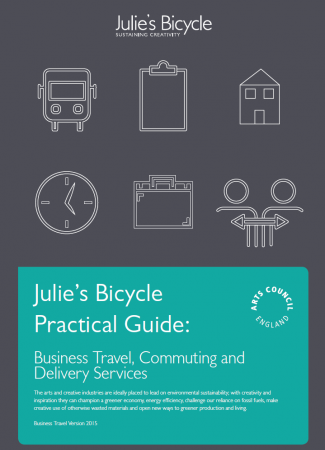ACTIONS
- Protect and safeguard cultural and natural heritage
- Learning and educational opportunities
- Cultural participation/social inclusion
- Sustainable tourism
- Support research
- Employment (recruiting, training, safety)
- Energy consumption, greenhouse gas emissions
- Waste management and reduction
- Transport (forms of, energy use)
- Commercial activities including copyright and IP
- Governance and management
- Security, disaster preparedness, risk reduction
- External partnerships and collaborations
- Toolkit/framework/roadmap
- Case studies
Julie’s Bicycle Practical Guide: Business Travel, Commuting and Delivery Services

Intended Audience
“This guide is aimed at anyone who is responsible for organising or overseeing travel and transportation for the organisation. It is also for anyone who travels in the course of work, including the daily commute and business travel.”
- Julie’s Bicycle
“This guide will walk you through ideas on how to reduce the amount and impacts of staff commuting, business travel and delivery services, across all sectors within the arts and to organisations of any size. It is broken down into subject areas, each containing tips on areas where you can take action..” (p.2)
Avaiable in
- English
SDGs LINKAGES
The resource can help support sustainable travel (11.2), adopting sustainable practices and sustainability reporting (12.6), promoting uptake of renewable energy (7.2), sustainable procurement (12.7) and institutional capacity to address climate change (13.3). The staff health and wellbeing aspect relates to SDG 3.4 (promote health and wellbeing) and 8.8 (protect labour rights and provide safe and secure working conditions).
Click on the SDG Target to discover Our Collections Matter indicators
-
Our Collections Matter indicators:
- Plans, policies and procedures in place for the safe use of collections, notably in relation to chemical, physical, biological and other forms of hazard.
- Proportion of users of collections facilities reporting positive well-being during and as a result of activities relating to collections.
- Number and proportion of programmes relating to collections that incorporate wellbeing considerations and perspectives.
- Number of targeted programmes drawing on collections that address issues relating to non-communicable diseases, supporting prevention and treatment.
-
Our Collections Matter indicators:
- Proportion of energy that comes from renewable sources.
- Date to achieve net zero, and milestones towards that date.
-
Our Collections Matter indicators:
- Number and proportions of staff working with collections in safe and secure working environments.
- Number of accidents and other health and safety incidents reported.
- Training and support provided for staff to ensure their wellbeing, health and safety.
- Education, awareness-raising and partnership programmes drawing on collections that address labour rights, notably those of migrant workers and others in precarious employment.
- Reduction of numbers and proportions of staff on short-term or zero-hours contracts.
- Fair pay policies and procedures in place to prevent exploitation.
- Procurement policies that ensure that collecting institutions make use of people who are in decent employment, and that avoid exploitation throughout the supply chain.
-
Our Collections Matter indicators:
- Clear visions, strategies and plans in place for all aspects of sustainability – environmental, social and economic (people, planet, prosperity)- across all areas of activity.
- Visions, strategies and plans relating to sustainability to be publicly available and incorporated into planning documents.
- Commitments to be in line with local, regional, national and/or international targets and ambitions.
- Incorporation of sustainability into reporting for funders and other stakeholders, including the public. Reporting to include commitments and progress towards targets.
-
Our Collections Matter indicators:
- Incorporation of sustainability considerations into procurement, in terms of advertisement and invitation to tender, contracts, and selection criteria for suppliers.
-
Our Collections Matter indicators:
- Plans in place to enhance positive contributions to addressing climate change through use of collections. Plans in place to ensure collections, collections institutions and broader society can adapt effectively to climate change.
- Plans in place for effective education and awareness raising on climate change mitigation, adaptation, impact reduction and early warning.
- Plans in place to reduce negative contributions of collections-related functions, e.g. measuring greenhouse emissions with plans and targets in place to reduce them.
-
Our Collections Matter indicators:
- Plans in place to ensure safe, affordable, accessible and sustainable transport systems for all, in terms of accessing collections-based institutions.
- Plans in place to use collections-based institutions to provide education and awareness of public transport systems and their development.
- Special attention to those in vulnerable situations, including women, children, disabled and older people, taken in plans regarding public tansport.
